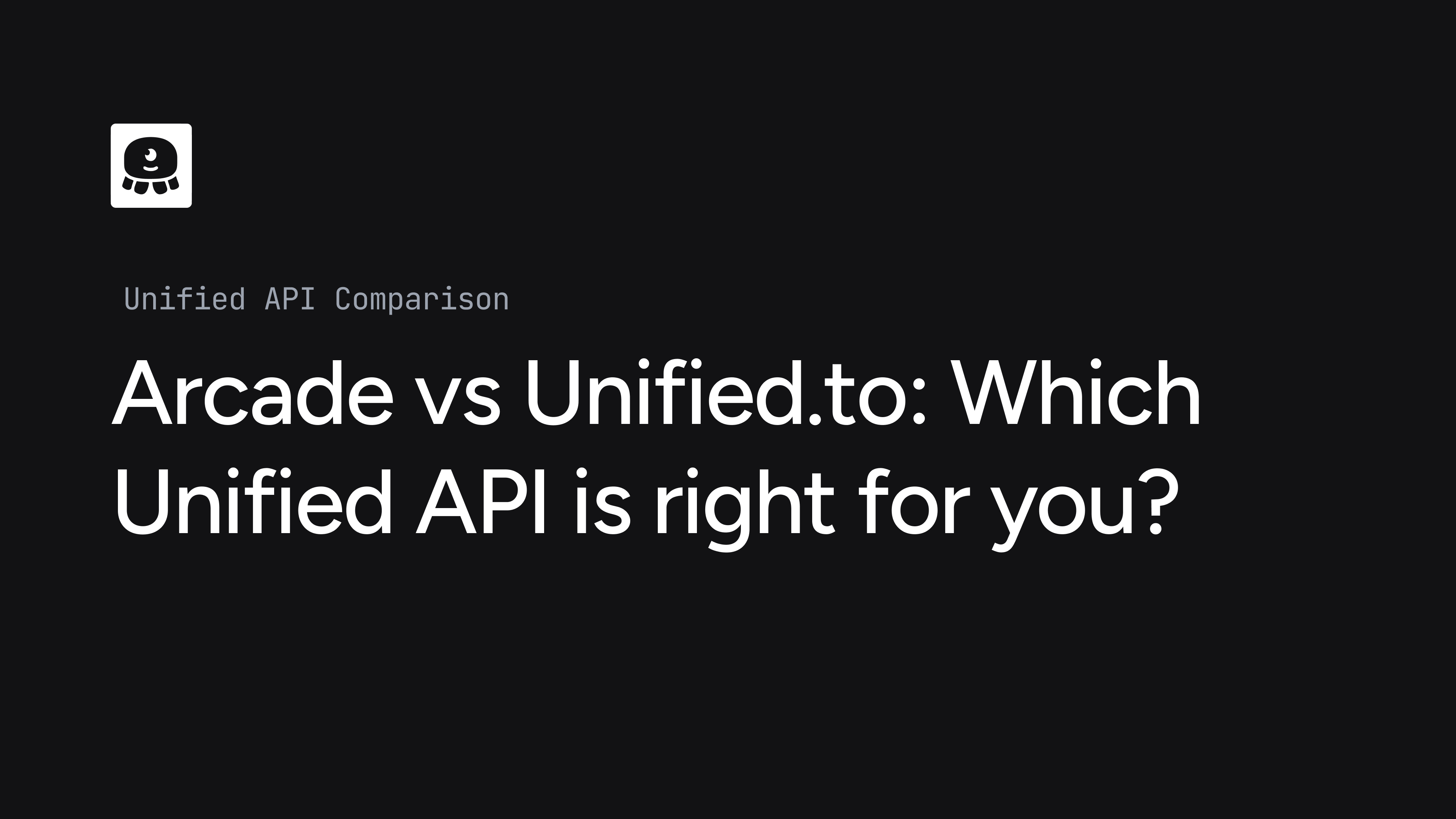Arcade.dev vs Unified.to: which integration platform powers AI-driven SaaS better?
June 15, 2025

Arcade.dev helps teams build AI assistants that can act on third-party tools. Unified.to helps SaaS teams build integrations that deliver real-time, normalized data across 300+ systems—from HR to CRM to file storage.
If you're building an AI agent that sends emails or creates calendar events, Arcade.dev is a flexible starting point. But if you need structured, real-time data pipelines across business systems, Unified.to is the better fit.
At a Glance: Unified.to vs Arcade.dev
Arcade.dev focuses on tool-calling for AI agents. Unified.to powers live data pipelines and structured integrations across your SaaS product.
Unified.to gives you:
- Real-time updates from 300+ integrations
- Unified schemas with passthrough support
- Database-ready delivery for AI pipelines and dashboards
- Zero data stored—tokens, payloads, or logs
- Developer-first SDKs and auth components
Here's how the two platforms compare, especially if you're building real-time AI features or integrations at scale.
Streaming vs single-use calls
Arcade.dev performs real-time calls when your agent or app needs to act—like sending a message or fetching a document. It doesn't offer webhook-based data sync or persistent pipelines. Developers must manage scheduling or polling if freshness is required.
Unified.to emits events via native webhooks or runs high-frequency polling under the hood (virtual webhooks). Data flows in real time to your backend or database—no cron jobs or manual refresh logic needed.
Tool actions vs normalized data
Arcade exposes each integration as a set of tools. One for Gmail, another for HubSpot, etc. There's no shared schema or consistent object model across platforms. Developers must handle varied outputs or rely on LLMs to interpret them.
Unified.to maps each domain (e.g. Contact, Job, Employee, Invoice) to a shared schema. You get structured, normalized data no matter which system the customer connects. No need to parse dozens of API variations.
Structured pipelines, not single responses
Arcade returns data at call time. There's no built-in support for change data capture, log streaming, or syncing data to a database. Developers must build those layers themselves.
Unified.to streams structured records to Postgres, MongoDB, Snowflake, and more. You get a clean data pipeline from 300+ platforms—no ETL, no caching.
Hosted vs customer-controlled
Arcade manages token storage by default. Some integrations allow you to bring your own OAuth credentials. Self-hosting is available for high-security use cases.
Unified.to never stores tokens or secrets by default. You can use your own AWS Secrets Manager to manage credentials. Unified.to proxies all requests and stores no payloads, tokens, or logs.
AI agent focus vs integration infrastructure
Arcade offers SDKs in Python and Node.js, with quickstarts for building Slack bots, Gmail assistants, and OpenAI-integrated workflows. Each integration is open source, but action-specific.
Unified.to provides SDKs in 7+ languages, plus drop-in auth components and an Integration Directory UI. Everything works against one schema, one Connect flow, and one webhook model—making it easy to scale integrations across categories.
TL;DR — Unified.to vs Arcade.dev
| Feature | Unified.to | Arcade.dev |
|---|---|---|
| Delivery model | Real-time streaming via webhooks | On-demand API calls, no data sync |
| Schema | Unified across 300+ APIs | Per-connector tool schemas |
| Database delivery | Native support for Postgres, Mongo, Snowflake, etc. | No built-in sync |
| Token storage | None by default (BYO Secrets Manager supported) | Stored in Arcade Cloud unless self-hosted |
| Data storage | Zero—no caching, logs, or customer data stored | No data caching, but calls routed through Arcade servers |
| Developer experience | Unified SDKs, auth component, real-time logs | Per-tool SDKs, OpenAI function calling |
| AI readiness | Structured data for RAG, analytics, and ML | Action-based tool calls for agents |
| Pricing | Usage-based tiers, all features included | User + call based, with free tier |
| Best for | SaaS platforms building AI-ready integrations and data pipelines | AI copilots and agents needing tool access |
Unified.to gives you real-time data, normalized schemas, and full control—no polling, no storage, no vendor lock-in.
If you're building a product that needs structured, fresh data across CRMs, HR, ATS, or storage platforms, Unified.to is the better foundation.
Start your 30-day free trial or book a demo to explore how fast you can ship real-time integrations at scale.
